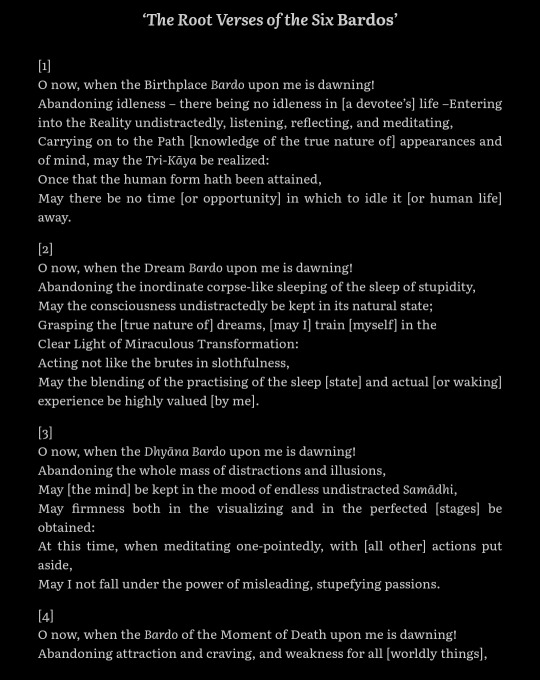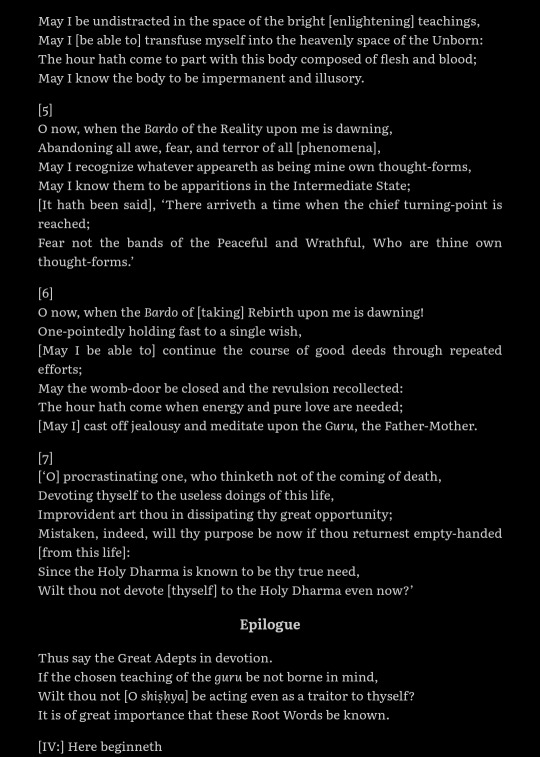#tibetan book of the dead
Text
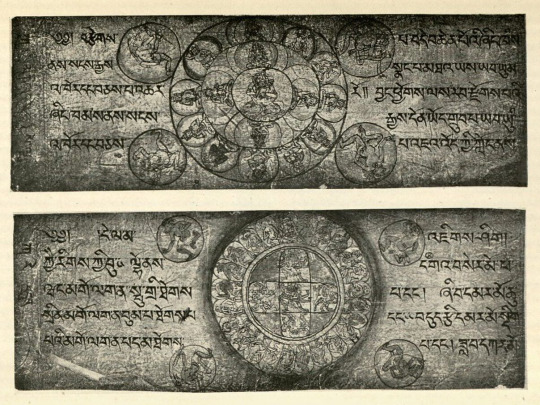
Pages from the Tibetan Book of the Dead.
#book of the dead#tibetan book of the dead#bardo thodol#karma lingpa#tibetan#tibetan alphabet#tibetan script#content
63 notes
·
View notes
Text
Are you enslaved to the sisyphean effort to escape yourself?
Are you ready to be here now?
You may fear the bonds of your own will,
But at its root is your deepest desire,
And this is your reason to be alive.
In truth, many of us are so afraid
Of just how vital this is to us
The freedom to fulfill this impulse
Is the most important thing,
If we were to open it, and it be denied
The result would be worse than death
So in attempting to avoid the determinism
Which comes with committing to oneself,
We are enslaved by fear,
Endless effort to escape our own hearts,
With nowhere to hide
Our will crumbles,
And our deepest desires
Are hidden among the rubble
Of our broken parts
But it is not too late now,
For it is the darkest hour
Which heralds the discovery
Of the secret of light
Be not afraid now,
For all else is spent,
And it is time to know yourself again,
Enter into your heart
With submission,
Innocently surrender
And you will remember who you are
2 notes
·
View notes
Text
What We Did Right
Instead of dwelling on our regrets and failings (and thereby perpetuating our miseries), here's a suggestion to connect with the enduring influences of the things we did right:
"The present moment is the dividing-line between progression and regression. The present moment is the time when, by lapsing into laziness, even for an instant, you will experience constant suffering. The present moment is the time when, by concentrating with singular intention, you will achieve constant happiness. Concentrate your mind with a single-pointed intention. Resolutely connect with the residual potency of your vitrtuous past actions." —The Tibetan Book of the Dead, as translated by Gyurme Dorje (though overall we much prefer the older Evans-Wentz translation)
30 notes
·
View notes
Text
The Transformative Power of Grieving: Finding Healing Through Storytelling and Presence in the Bardo’s
Twitter
Patreon
GitHub
LinkedIn
YouTube
Preamble: Confessions
I lost my papa recently. And while I never sometimes my father, it was Papa who failed in presence, support, and generosity. Merten Wolfe changed his name to Martin Rankin upon immigrating from a postwar Germany, when America was pregnant with late stage capitalism and MTV still played music videos. We come from a clan of Romani…
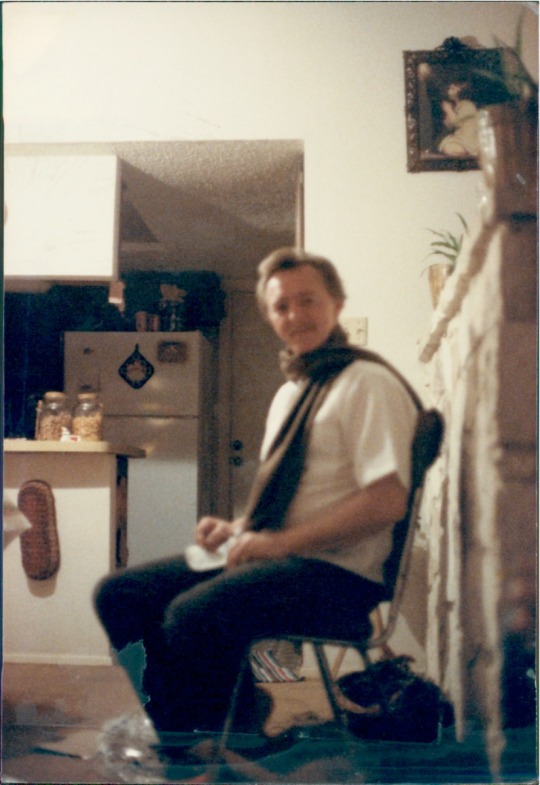
View On WordPress
#bardo#bardos#book of the dead#buddha#buddhism#buddhist#grief#living and dying#loss#Poem#Poetry#psychology#taoism#taoist#Tibetan#Tibetan book of the dead#Tibetans
2 notes
·
View notes
Text
If anyone is struggling with their own mortality or with the loss of someone and need guidance; might I humbly suggest reading Chapter 2 of The Tibetan Book of the Dead. It will make you rethink how you view death. The art of dying is just as important as the art of living
#death#dying#mortality#struggle with death#tibetan book of the dead#the tibetan science of death#mine#personal#random thought tangents
3 notes
·
View notes
Text
"It seems coming to life is not necessarily a thing to be celebrated.
Just as death is not always something to be mourned, being born is not necessarily a joy in itself.
What is the meaning in our journey through life and death? Seeking the truth and practicing compassion, that is the way life becomes meaningful.
When you are born you cry, but the whole world is overjoyed. When you die the world cries, but you may find the great liberation."
- The Tibetan Book of the Dead documentary (1994), narrated by Leonard Cohen
#bardo thodol#buddhism#samsara#nirvana#death#birth#leonard cohen#tibet#tibetan#tibetan book of the dead
12 notes
·
View notes
Text
“Oh nobly-born, listen, undistractedly.
On the Fourth Day, the red light, which is the primal form of the element fire, will shine.
At that time, from the Red Western Realm of Happiness, the Bhagavan Buddha Amitabha, red in colour, bearing a lotus in his hand, seated upon a peacock-throne and embraced by the Divine Mother Gokarmo, will shine upon thee..”

2 notes
·
View notes
Text
Thus thinking, put thy trust in them and exercise sincere love towards them. Then whatever is done for thee [by those] left behind will truly tend to thy benefit. Therefore the exercise of that love is of much importance; do not forget this.
— Padmasambhava, Bardo Thodol
6 notes
·
View notes
Text
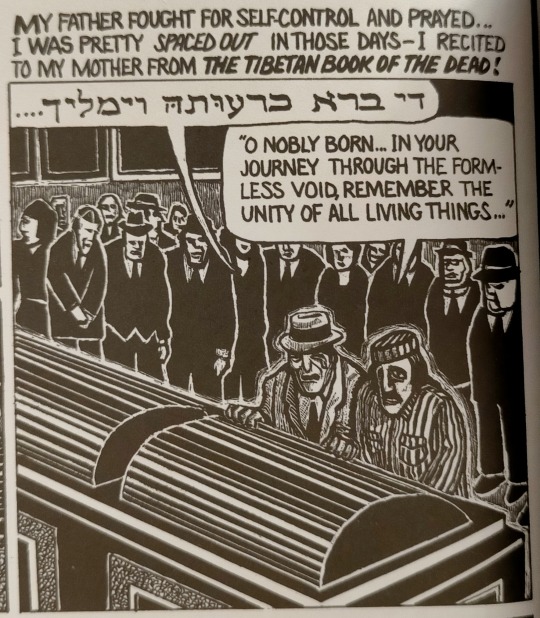
"The Complete Maus" - Art Spiegelman
#book quote#maus#art spiegelman#nonfiction#prisoner on the hell planet#father#family#death#fighting#self control#praying#spaced out#tibetan book of the dead#funeral
1 note
·
View note
Text

Have you been to Ray's Occult Bookstore in Greenwich Village?
#ghostbusters#ray stantz#occult#occult bookstore#nyc#greenwich village#movies#tibetan book of the dead
0 notes
Text
How To Die- Instructions from the Tibetan Buddhist Tradition
Today is my birthday, the inception of a dangerous, insonsolable and heart wrenching war in the Middle East. It is a particulary poignant fall day as one of my very close friends is dying. He is called a Vajra Brother, and we have many of the same teachers and he sent this to me as a guide as to how to help him. I thought I would offer it to you all, as indeed, we all will pass, and there are…

View On WordPress
#and Karmic Becoming#How To Die- Instructions from the Tibetan Buddhist Tradition#Luminous Dharmata#mind#Tibetan Book of the Dead#Training Guide to the Bardos of Dying
0 notes
Video
youtube
What is the Tibetan Book of the Dead?
1 note
·
View note
Text
life between lives: case study 1
♡︎ soul sees dead body in hospital, doesn't feel dead, sees grieving family
♡︎ influenze pandemic
♡︎ younger soul
♡︎ memories in the super-conscious
♡︎ 1866, great pain, throat, choking
♡︎ soul's can leave their human hosts minutes before death
♡︎ sensations at time of death - a force of some kind pushing soul out of the dead of the body - 'me' comes out. 'I' come out
♡︎ radiate light, light energy, transparent white soul, energy light grows a little as it moves around
♡︎ the light expands, whispy
♡︎ shed my skin
♡︎ lose my body in one swoosh
♡︎ freeing, wonderful feeling
0 notes
Text
Traveler, thank you for taking the fourth step with us on our Book Club Adventure. In This Section we read the Purification Mantra and really start to understand some of the cosmology of thought in these texts and prayers. Please Join Samantha and Tal as they take the next steps of descent taking the time to feel the ground beneath their feet.
MUSIC: Silent World | Bamf (bandcamp.com)
Prayer: Buddhist Mantras, Vol.4 | Tinna Tinh (bandcamp.com)
#bad art#badart#glitchartistscollective#vaporwave#glitch art#mental health#vaporwaves#glitch aesthetic#glitchmafia#male mental health#glitchart#podcast#spiritual development#spicy content#spirituality#buddhism#buddhist#buddha#tibetan art#tibetan book of the dead#books and reading#book recommendations#bookclub#reading#Spotify
0 notes
Text
Dean’s Soul in the Bardo - The Art of Dying 1x06 The Winchesters
Catching up British-time, so a bit late to the party as usual, and coming to it fresh, as I like to do, without jumping into the time-line first.
Screeches a bit because I am overwhelmed.
This episode suggests that, on one level, we can read every character in The Winchesters as manifestations of Dean’s consciousness, as he hovers in the “bardo”, the liminal realm in Tibetan Buddhism, between death and reincarnation.
Mary - the leader and hunter who wants to get out of hunting; John - filled with wounded rage, Daddy-issues and violence; Carlos - the fabulous bisexual who dares to get into therapy and to go after the men he wants; Lata - the abused child who manages to chose love over violence - ALL OF THESE ARE ASPECTS OF DEAN WINCHESTER’S being, his experience/ soul/ desires <sobs a little because it’s beautiful>.
Now I’m back on my meta, I’ve previously mused on The Winchesters as a reparative narrative told by Holy Ghost Dean Winchester; a counter-point to the traumatic narrative of Supernatural.
1x06 The Art of Dying offers further illumination and elaboration on that concept, namely:
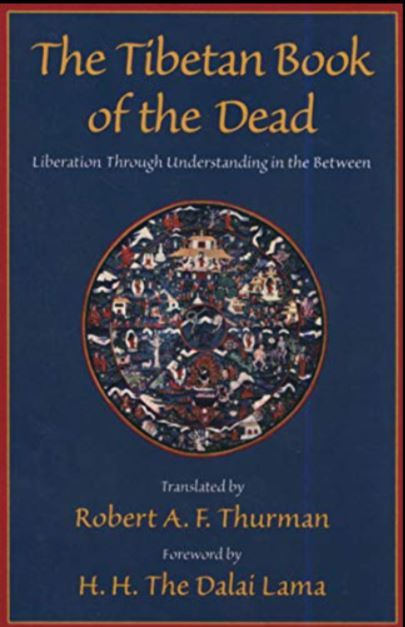
The episode title, “The Art of Dying” is a George Harrison song, the right time-period for The Winchesters (1970), from his album All Things Must Pass.
The Beatles, in keeping with the hippie counterculturalism of the time, were interested in Eastern spirituality, particularly Hinduism and Buddhism, and this Harrison song was inspired by his reading of Timothy Leary’s The Psychedelic Experience: A Manual Based on The Tibetan Book of the Dead (1964).
Harrison’s lyrics are about the religious philosophy of perfecting the soul through cycles of reincarnation:
“There'll come a time when all of us must leave here
There's nothing Sister Mary can do, will keep me here with you
As nothing in this life that I've been trying
Can equal or surpass the Art of Dying....
There'll come a time when most of us return here
Brought back by our desire to be a perfect entity
Living through a million years of crying
Until you realize the Art of Dying “
A theme which fits well with the Ouroboros (serpent swallowing it’s own tail as it ascends) narrative of latter-day Supernatural, which drew on Jung and esoteric alchemy to manifest the Winchesters’ journey as the journey of the soul towards God.
The Tibetan Book of the Dead is the Bardo Thodol, which means “liberation through hearing in the intermediate state”. It is a 14thC esoteric text (or possibly older but that’s when the written text we have dates from).
John, Mary, Lata and Losy all struggle with pain, parent-induced and violence-induced and hunting-induced trauma, but they are able to communicate their feelings to one another in a way which is strikingly and remarkably different from the enormous struggles with emotional articulation which animated Supernatural, which we watched Dean suffer with throught his life.
So we can read The Winchesters as Dean’s revelatory hallucinations in the liminal state between death and liberation (or rebirth) - his revelatory sexual and emotional healing soul-dreams (in which, and what could be more Freudian, he returns to the scene of his parents).
And look, Lata is teaching John, who surived being possessed by the vengeful spirit of abused-as-a-child and violently out-of-control Mac, how to meditate and achieve higher consciousness (with an image of a globe in the background):
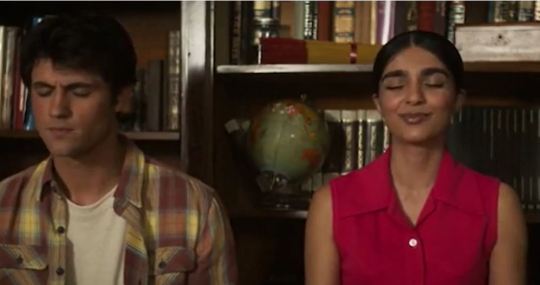
And isn’t it interesting that the rare type of vampire which Mac’s vengeful spirit first possesses is called a “soucouyant”, which means (incongrously, one would think) “carefree” in French. But not so incongruous if The Winchesters is about the journey of Dean’s soul to liberation, to bliss, to being “carefree”...
#Supernatural#The Winchesters#The Winchesters meta#SPNWin 1x06#The Art of Dying#Holy Ghost Dean Winchester#I am in love with this concept#The cycle of death and rebirth#Ouroboros narrative#The Tibetan Book of the Dead
103 notes
·
View notes
